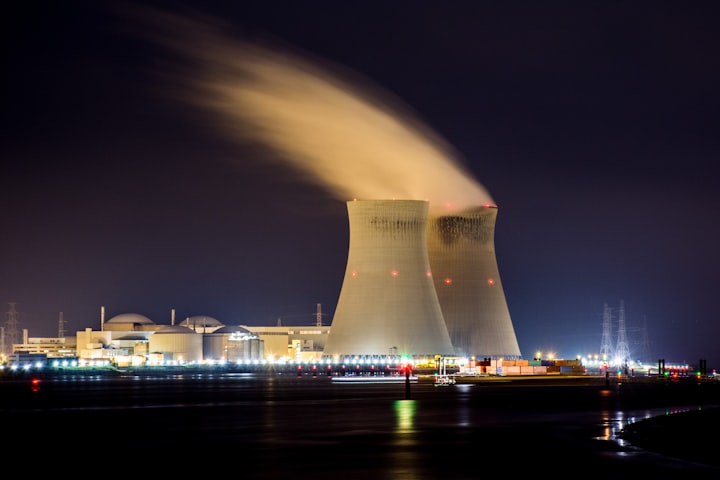A Journey into the Heart of the Atom
Unraveling the Mysteries of Nuclear Chemistry

Introduction
Nuclear chemistry, a branch of chemistry that explores the properties and behavior of radioactive substances, is a captivating field that delves into the heart of the atom. This discipline not only elucidates the intricate processes occurring within the nucleus but also plays a pivotal role in diverse scientific arenas, ranging from medical diagnostics to energy production. In this article, we will embark on a journey into the world of nuclear chemistry, unraveling its fundamental principles and exploring its applications.
Understanding the Atom
At the core of nuclear chemistry lies the atom, the building block of matter. Classical chemistry primarily concerns itself with the interactions of electrons in the outer shells of atoms, determining their chemical properties. However, nuclear chemistry focuses on the nucleus—the central, densely packed core of the atom—where protons and neutrons reside.
Isotopes and Radioactivity
One of the key aspects of nuclear chemistry is the concept of isotopes. Isotopes are variants of an element that have the same number of protons but differ in the number of neutrons. This nuclide variability gives rise to different atomic masses within a single element. Some isotopes, especially those with an unstable balance of protons and neutrons, exhibit radioactivity.
Radioactivity is the spontaneous emission of particles or radiation from the nucleus of an unstable atom. This phenomenon was first discovered by Henri Becquerel in 1896 and further explored by Marie and Pierre Curie. The three primary types of radiation are alpha, beta, and gamma radiation. Each type has distinct properties, with alpha particles being helium nuclei, beta particles being high-energy electrons, and gamma radiation being electromagnetic waves.
Nuclear Reactions
Nuclear reactions involve changes in the composition of atomic nuclei and are characterized by alterations in the number of protons and neutrons. Unlike chemical reactions, which involve the rearrangement of electrons, nuclear reactions are much more energetic and release vast amounts of energy. The most famous example of a nuclear reaction is the equation E=mc², formulated by Albert Einstein, which describes the equivalence of mass and energy.
Fission and Fusion: Harnessing Nuclear Energy
Two significant nuclear processes, fission and fusion, have revolutionized our understanding of nuclear chemistry and its applications. Nuclear fission involves the splitting of a heavy nucleus into smaller fragments, releasing an immense amount of energy. This process is the basis for nuclear power plants, where controlled fission reactions generate electricity.
Conversely, nuclear fusion is the process by which light atomic nuclei combine to form a heavier nucleus, liberating even more energy. While fusion is the power source of the sun, recreating controlled fusion reactions on Earth has proven challenging due to the extreme conditions required for its initiation.
Applications of Nuclear Chemistry
Nuclear chemistry finds applications in various fields, positively impacting our lives in ways we may not always be aware of. Here are some key areas where nuclear chemistry plays a crucial role:
Medical Imaging:
Radioactive isotopes are widely used in medical imaging techniques such as positron emission tomography (PET) and single-photon emission computed tomography (SPECT). These technologies allow for non-invasive visualization of internal structures and aid in the diagnosis and monitoring of diseases.
Cancer Treatment:
Radiotherapy utilizes controlled doses of radiation to target and destroy cancer cells. This method has proven effective in treating various forms of cancer, showcasing the therapeutic potential of nuclear chemistry in medicine.
Nuclear Power:
Nuclear power plants harness the energy released during controlled nuclear fission reactions to generate electricity. Despite concerns about safety and radioactive waste, nuclear power remains a significant contributor to the global energy grid, providing a reliable and low-carbon alternative to fossil fuels.
Environmental Monitoring:
Radioactive tracers help scientists study environmental processes such as ocean circulation, air and water pollution, and nutrient cycling. These tracers allow for the tracking of substances and understanding their behavior in different ecosystems.
Archaeological Dating:
Isotopic analysis is crucial in dating ancient artifacts and fossils. Carbon-14 dating, for instance, relies on the radioactive decay of carbon isotopes to estimate the age of organic materials, providing valuable insights into human history and evolution.
Challenges and Ethical Considerations
While nuclear chemistry offers numerous benefits, it is not without its challenges and ethical considerations. Safety concerns, particularly in the operation of nuclear power plants, radioactive waste disposal, and the potential for nuclear accidents, highlight the need for stringent regulations and ongoing research in the field.
Additionally, the proliferation of nuclear weapons remains a global concern, emphasizing the delicate balance between the peaceful applications of nuclear chemistry and the potential for misuse. International cooperation and strict non-proliferation agreements are essential in mitigating these risks and ensuring the responsible development of nuclear technologies.
Conclusion
In conclusion, nuclear chemistry stands as a fascinating and multifaceted discipline that delves into the very essence of matter. From unraveling the mysteries of the atom to revolutionizing energy production and medical diagnostics, its impact is pervasive in our modern world. As we continue to explore and understand the intricacies of nuclear processes, it is crucial to approach these advancements with a sense of responsibility and ethical awareness. The journey into the heart of the atom is ongoing, and the discoveries made in nuclear chemistry will undoubtedly shape the future of science and technology.
About the Creator
Reader insights
Good effort
You have potential. Keep practicing and don’t give up!
Top insight
Expert insights and opinions
Arguments were carefully researched and presented






Comments (1)
thanks